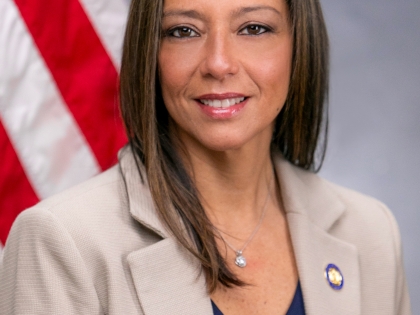
New York State Approves 2025 Budget
April 29, 2024
New York State has approved its FY 2025 budget, laying out a comprehensive plan that invests in education, public health and safety, and the lives of residents. For Senator Monica R. Martinez, her primary goal within the fiscal framework was to prioritize the needs of Long Islanders.
“A budget is the compromise of deeply held convictions packaged as a spending plan,” said Senator Martinez. “Coming into this process, I sought to find common ground where possible while remaining committed to the principles that protect Suffolk County residents and suburban communities generally. While this budget doesn’t entirely reflect my vision, there are areas where we were successful in advancing the needs of Long Island.”
The $237 billion spending plan agreed to by the Governor, Senate and Assembly:
Supports our Students and Schools and Colleges
In a decision that will benefit all Suffolk County school districts, the FY 2025 budget rejects changes to the Foundation Aid formula, ensuring that essential funding remains intact for schools across Long Island and the state. The budget also includes significant investments, including:
- $205.6 million in additional aid for Long Island schools with an average 4.3percent year-over-year increase for districts within the Fourth Senatorial District. The proposed Executive Budget, if left unchanged, would have resulted in over a $12 million loss in aid to these same districts.
- $2 million for services and expenses in the financially stressed Amityville School District.
- $11,108,600 for services and expenses at SUNY Farmingdale State College.
- Raising the maximum income threshold for TAP eligibility from $80,000 to $125,000.
- Increasing the minimum TAP award from $500 to $1000.
Provides Tax Relief for our Residents
New York’s 2025 budget is dedicated to enhancing affordability for New Yorkers by reducing taxes on working families. The budget:
- Doesn’t raise personal income taxes.
- Provides an additional $50 million in unrestricted aid to local municipalities known as AIM funding. The boost is the first since 2010 and provides the Towns of Babylon and Islip and Villages of Amityville, Brightwaters, Islandia, and Lindenhurst each with a 7 percent increase in support. This will enable them to fund essential services and deliver tax stabilization. As Chairperson of the Senate Standing Committee on Local Government, Senator Martinez advocated for additional funding after hearing from municipal leaders throughout the state about its importance for their budgets and providing services to constituents.
- Includes $350 million for a new supplemental tax credit for families eligible for the Empire State Child Tax Credit.
- Approves the Newspaper and Broadcast Media Jobs Program that provides payroll tax credits for media companies based in New York that create and retain jobs in journalism.
Protects our Safety
The approved FY 2025 budget is committed to creating safer communities by addressing crime and the criminal acts that threaten New Yorkers. This budget:
- Increases criminal penalties for assaults against retail workers.
- Provides funding to combat “Smash and Grab” robberies and retail theft rings, including for hiring additional law enforcement personnel.
- Allocates $36 million to prosecute domestic abusers.
- Adds 23 offenses that can be prosecuted as hate crimes.
- Combats the growing incidents of deed theft across New York State.
Funds Improvements to our Environment
New York’s FY 2025 budget prioritizes environmental stewardship and sustainability by safeguarding New York’s vital habitats, ecosystems and addressing water contamination threats. By aligning with climate-focused legislation, the budget bolsters efforts to mitigate climate change impacts and promote sustainable practices, fostering a greener future for all New Yorkers. These measures will:
- Dedicate $500 million to clean water infrastructure.
- Advance $3 million to Suffolk County to provide a 50 percent match for a program to address nitrogen and pathogen loading.
- Provide $1.5 million for Suffolk County for sewer improvement projects.
- Allocate $500,000 to Save the Great South Bay
Invests in Building out a Place to Call Home:
Housing is essential for creating stability for New York’s residents and its communities. To help increase New York’s housing inventory, the FY 2025 budget provides:
- $600 million in capital funding to support housing statewide.
- $150 million for new programs to build rental and homeownership units across the state for residents with an income at or below 130 percent of the Area Median Income.
- Provides Local municipalities with the authority to adopt incentives for both mixed-income and 100 percent affordable housing outside, and to support development of accessory dwelling units throughout the state.
Enhances our Health and Affirms our Commitment to Parental and Child Well-being
The approved FY 2025 advances the health of New Yorkers, strengthens family bonds and protects children by:
- Eliminating insulin cost-sharing for all commercial health plans.
- Establishing a first-in-nation paid prenatal leave, providing 20 hours of paid sick time for employees to use for prenatal related care visits.
- Providing employees with a paid 30-minute break for breast milk expression.
- Ensuring children from the ages of 0-6 can remain continuously enrolled in Medicaid or CHIP without their parent or guardian needing to redetermine eligibility or add them to their own health plan.
In the FY 2025 budget, Senator Martinez was also able to secure:
- $187,000 in funding to restore the Adelphi NY Statewide Breast Cancer Hotline.
- $500,000 in funding for gang prevention youth programs in Nassau and Suffolk counties.
- $200,000 in funding for the New York Committee for Occupational Safety and Health to improve worker safety on Long Island.
- $350,000 in funding to fight hunger on Long Island through support of Long Island Cares and Island Harvest food banks.



